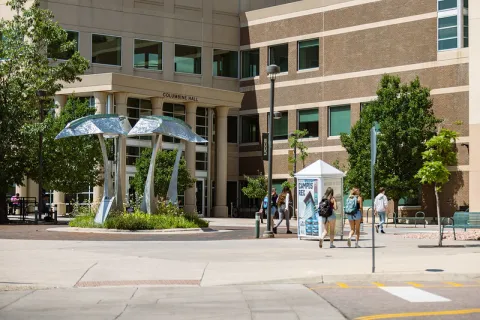
Graduate Programs
Join a distinguished graduate program designed to enhance the skills and knowledge that will help you build a successful career.Master of Arts (MA) Programs
Psychology MA - Psychological Science Track
The psychological science track of the Master of Arts in Psychology provides the student with a solid foundation in psychological research. The program includes coursework in psychological science design, research methodology, and statistics.
Application Deadline: December 15
Psychology, MA - Clinical Psychology Track
The clinical track of the Master of Arts in Psychology is an adult-focused program that follows the Boulder scientist/practitioner training model which emphasizes the integrated roles of science and practice.
Application Deadline: December 15

PhD Programs
Clinical Psychology PhD. with Major Area of Study in Geropsychology
This APA-accredited program trains students according to the scientist-practitioner model in mental health diagnosis, assessment, and intervention for adults and older adults, and in basic and applied research on the psychological functioning of adults and aging individuals. Upon completion of the program, students will be prepared to work in a range of settings, including mental health clinics and clinical practices, hospitals, nursing homes, colleges and universities, state offices, research institutes, and as consultants to a wide variety of housing and social service providers to adults and older adults.
Application Deadline: November 15
Additional Program Resources:
Clinical Psychology PhD with Major Area of Study in Trauma
This APA-accredited program trains students according to the scientist-practitioner model in mental health diagnosis, assessment, and intervention for adults who have experienced traumas, and in basic and applied research on the psychological functioning of adults with a trauma history. Upon completion of the program, students will be prepared to work in a range of settings, including mental health clinics and clinical practices, hospitals, VAs, colleges and universities, state offices, research institutes, and as consultants to a wide variety of other professional and community providers of services to adults who are trauma survivors.
Application Deadline: November 15
Additional Program Resources:

Graduate Psychology Program FAQs
Graduate psychology programs have been a part of the UCCS Psychology Department since 1977. You'll learn from our faculty in an environment designed for learning, research , and student success – smaller class sizes than our peer institutions and the ability to connect one-on-one with your professors and supervisors.


MA - Clinical Psychology & Psychological Science Track
Laith Al-Shawaf, Ph.D., Professor
Elizabeth Bauer, Ph.D., Assistant Professor
Charles C. Benight, Ph.D., Professor
Steven L. Bistricky, Ph.D., Associate Professor
Frederick L. Coolidge, Ph.D., Professor
Leilani Feliciano, Ph.D., Professor
Kyrsten Hill, Ph.D., Assistant Professor
Lori E. James, Ph.D., Professor
Michael A. Kisley, Ph.D., Professor
Andrew Lac, Ph.D., Associate Professor
Heather Littleton, Ph.D., Professor
Kristen L. Rudd, Ph.D., Assistant Professor
Daniel L. Segal, Ph.D., Professor
Diana Selmeczy, Ph.D., Assistant Professor
Rachel E. Thayer, Ph.D., Assistant Professor
Joseph Wagoner, Ph.D., Assistant Professor
Rachel Weiskittle, Ph.D., Assistant Professor
NOTE: Faculty who are interested in taking new graduate students are not obligated to do so.
Clinical Psychology PhD. with Major Area of Study in Geropsychology
Laith Al-Shawaf, Ph.D., Professor
Frederick L. Coolidge, Ph.D., Professor
Leilani Feliciano, Ph.D., Professor
Kyrsten Hill, Ph.D., Assistant Professor
Daniel L. Segal, Ph.D., Professor
Rachel Weiskittle, Ph.D., Assistant Professor
NOTE: Faculty who are interested in taking new graduate students are not obligated to do so. Taking on new doctoral students is heavily dependent on funding availability. A faculty member who is interested in taking new doctoral students may not end up having the funding to do so.
Clinical Psychology PhD with Major Area of Study in Trauma
Laith Al-Shawaf, Ph.D., Professor
Elizabeth Bauer, Ph.D., Assistant Professor
Steven L. Bistricky, Ph.D., Associate Professor
Frederick L. Coolidge, Ph.D., Professor
Heather Littleton, Ph.D., Professor
NOTE: Faculty who are interested in taking new graduate students are not obligated to do so. Taking on new doctoral students is heavily dependent on funding availability. A faculty member who is interested in taking new doctoral students may not end up having the funding to do so.
Mission Statement

Graduate education in the Psychology Department will be responsive to the general recommendations of the American Psychological Association.
Graduate training programs will be primarily designed and executed by the programs’ faculty, but all graduate students are required to have broad core competence in the field of psychology.
Graduate training will emphasize providing a strong foundation in psychology as a science for students aiming to become researchers, academicians, and/or practitioners.